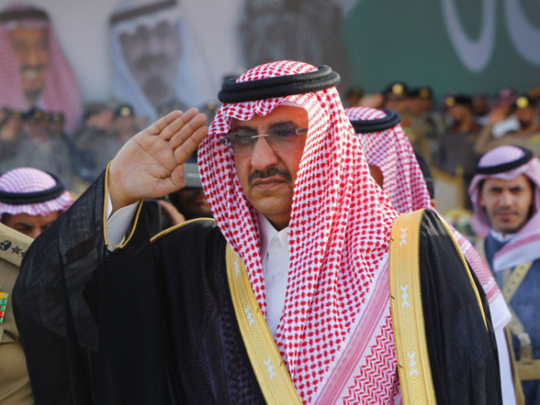
Riyadh: Saudi Interior Minister Mohammad Bin Nayef, perhaps the most powerful younger prince in the ruling Al Saud family, is shaping Riyadh’s new emphasis on protecting the kingdom from a fresh wave of Islamist militancy inspired by the war in Syria.
The United States pulled out the stops for him when he visited Washington last week to prepare for President Barack Obama’s fence-mending trip to Riyadh next month.
Secretary of State John Kerry, National Security Adviser Susan Rice, Central Intelligence Agency chief John Brennan, Homeland Security Secretary Jeh Johnson, Federal Bureau of Investigation director James Comey and National Security Agency director Keith Alexander all sat down with the 54-year-old, a veteran of Saudi Arabia’s fight against Al Qaida.
Prince Mohammad seems likely to be a central figure in the world’s top oil exporter for decades to come. Many Saudis say he is a strong candidate to become king one day.
“He’s now playing not only the role of Interior Minister, but also that of a senior diplomat and adviser to the king,” said Robert Jordan, US ambassador to Riyadh from 2001-03.
“He is probably someone destined for even greater responsibilities in Saudi Arabia in due course,” he said.
In recent weeks Prince Mohammad’s influence has become more apparent in Saudi policy on Syria, where the kingdom’s rulers fear their support for rebels battling President Bashar Al Assad may inadvertently revitalise radicalism at home.
Officials in Riyadh have noticed an increase both in Saudi jihadis leaving for Syria and in online chatter supporting Islamist militancy. This month King Abdullah decreed prison terms of 3-20 years on Saudis who go abroad to fight.
Saudi Arabia’s goal of toppling Al Assad, an ally of its regional rival Iran, is unchanged, but it is refocusing on countering militancy, and is trying to ease differences on Syria with Washington, say Saudi and diplomatic sources in the Gulf.
So Prince Mohammad, who has built trust with US security officials over a decade of cooperation against Al Qaida in Saudi Arabia and Yemen, is playing a bigger role.
“He has a lot of credibility,” said a diplomatic source in the Gulf. “The fact that he is going to Washington now to say terrorism is a shared concern is a smart message.” Obama’s visit to Riyadh is aimed at smoothing three years of tensions between the two historic allies over policy on Syria, Iran and Egypt. Saudi Arabia still hopes to convince the United States to adopt a more muscular approach on Syria that would counter both Al Assad and the rebel groups closest to Al Qaida.
“Everybody thinks he is a good friend. Both liberals and conservatives will say ‘I sat with Mohammad Bin Nayef’. He cannot be labelled as one thing or another,” said Jamal Khashoggi, head of a TV news channel owned by a Saudi prince.
One clue to his approach lies in a dingy suburb of eastern Riyadh, behind high sandstone walls topped with razor wire: the Prince Mohammad Bin Nayef Centre of Counselling and Care.
Better known abroad as Saudi Arabia’s controversial rehabilitation programme for militants, the centre is the only institution named for Prince Mohammad in a country where senior royals wear their attachment to favoured causes with pride.
It blends Western techniques such as psychiatry with lectures by clerics, who do not dispute the virtues of waging jihad, but who insist it is the prerogative of the state.
“He understands the connection between education, faulty religious teaching and extremism,” said Jordan, the former ambassador, who said he spent many nights sitting up with Prince Mohammad discussing such issues after the September 11, 2001, attacks on the United States, in which 15 Saudis took part.
“His approach was to counter the source of those fraudulent and erroneous interpretations and to explain, using Quranic principles, the way extremists were twisting things,” he said.
By showing mercy to militants, he was also working to show Saudis that the government was not the dictatorship Al Qaida had painted it as. The programme has not been an undiluted success, with some of its alumni fleeing to Yemen to resume the struggle.












